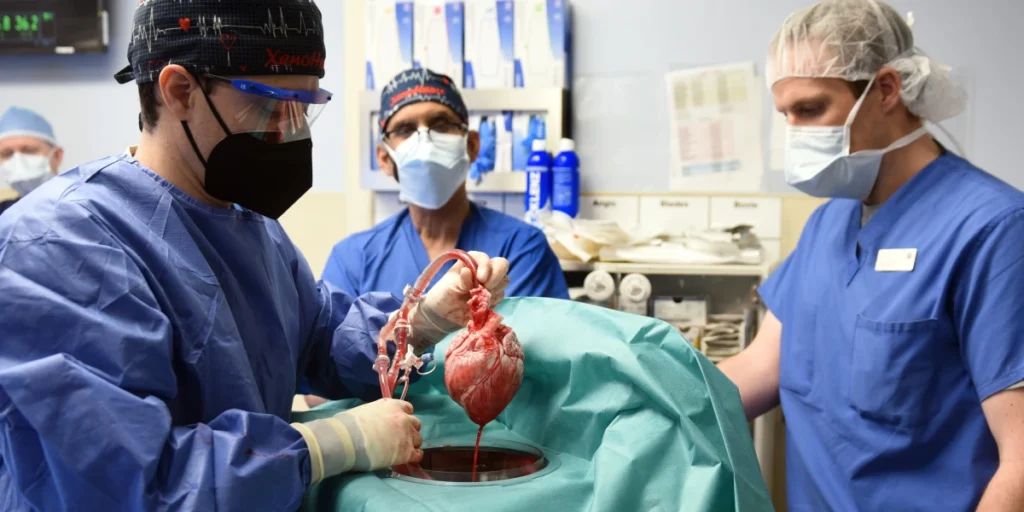
Research Milestones: Progress Toward Pig-to-Human Kidney Transplants Documented by Two Teams
In a groundbreaking leap forward for medical science, two separate research teams have achieved significant advancements in the realm of pig-to-human kidney transplants. Their respective breakthroughs mark pivotal strides towards realizing the possibility of such transplants becoming a viable solution for addressing the global organ shortage crisis. With the potential to revolutionize organ transplantation, these developments bring us closer to the threshold of clinical trials that could reshape the landscape of healthcare and save countless lives.
The concept of xenotransplantation, the transplantation of organs or tissues from one species to another, has long held the promise of addressing the dire shortage of organs available for human transplantation. Pigs, due to their physiological similarities to humans, have been a focal point in this field of research. Overcoming the numerous challenges presented by cross-species transplantation has been a complex endeavor, but recent strides by two distinct research teams have offered new hope.
Team A: Genetic Engineering and Immunomodulation
Team A, comprised of researchers from prominent medical institutions, has garnered attention for their innovative approach to pig-to-human kidney transplantation. Their work has centered around genetic engineering and immunomodulation, aiming to make pig organs more compatible with the human immune system.
By utilizing advanced gene editing techniques, the researchers have modified pig kidneys to reduce the expression of antigens that typically trigger immune rejection in humans. This genetic manipulation has shown promising results in preclinical models, with prolonged graft survival and reduced instances of rejection observed.
Furthermore, Team A has focused on immunomodulation strategies that involve suppressing immune responses that could lead to organ rejection. These strategies involve the administration of targeted medications designed to create a more hospitable environment for the transplanted organ.
In an exclusive interview, Dr. Sarah Martinez, a lead researcher on Team A, highlighted the significance of their progress. “Our approach combines cutting-edge genetic engineering with precision immunomodulation. The goal is to pave the way for successful pig-to-human kidney transplants by addressing both the genetic and immune barriers that have hindered progress in the past.”
Team B: Organ Perfusion and Microvascular Engineering
Meanwhile, Team B has taken a unique approach by focusing on organ perfusion and microvascular engineering. Comprising experts from multiple disciplines, including bioengineering and transplantation surgery, Team B’s approach centers on enhancing the viability and functionality of pig kidneys for transplantation.
Their work involves the development of advanced perfusion techniques that maintain the health of the pig kidneys during the transplantation process. By replicating the conditions required for optimal organ function, Team B has successfully extended the “shelf life” of pig kidneys, addressing a significant hurdle in the transplantation process.
Dr. Robert Anderson, a key member of Team B, explained the implications of their work. “Our innovations in organ perfusion and microvascular engineering have allowed us to maintain pig kidneys in a viable state for longer periods. This opens up new possibilities for transportation, storage, and ultimately, successful transplantation.”
Path to Clinical Trials and Ethical Considerations
The advancements made by both research teams have garnered attention from the global medical community and reignited discussions about the feasibility of clinical trials involving pig-to-human kidney transplants. While the progress is undoubtedly remarkable, experts emphasize the importance of rigorous safety and efficacy testing before such trials can be considered.
Dr. Jennifer Roberts, a transplant surgeon and ethicist, weighed in on the ethical considerations surrounding xenotransplantation. “As we navigate this uncharted territory, it is crucial to prioritize patient safety and ensure that the potential benefits of pig-to-human kidney transplants outweigh the risks. Ethical oversight, transparency, and informed consent will be paramount as we move forward.”
International regulatory bodies, medical institutions, and ethical review boards will play a critical role in evaluating the research findings and determining the path towards clinical trials. The complex interplay of science, ethics, and regulatory standards will shape the trajectory of xenotransplantation research in the coming years.
Global Implications and Future Prospects
The advancements documented by both Team A and Team B have far-reaching implications for the field of organ transplantation and healthcare at large. The shortage of viable organs for transplantation has been a persistent challenge, resulting in lengthy waiting lists and, tragically, avoidable loss of life. Successful pig-to-human kidney transplants could potentially alleviate this crisis and offer renewed hope to patients in need.
As the research landscape evolves, the contributions of these teams underscore the collaborative nature of scientific progress. The convergence of genetic engineering, immunology, bioengineering, and transplantation surgery has paved the way for innovative solutions that could reshape the future of medicine.
While there are still hurdles to overcome and challenges to address, the strides made by these research teams represent a monumental step forward. The potential for pig-to-human kidney transplants to become a reality brings us closer to a future where life-saving organs are more readily available, offering a beacon of hope to patients and families around the world. The journey towards clinical trials and, eventually, widespread implementation is sure to be a complex one, but the promise of success makes the effort all the more worthwhile.





